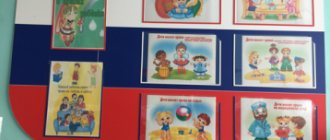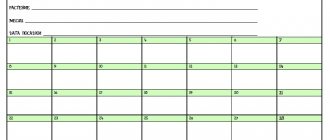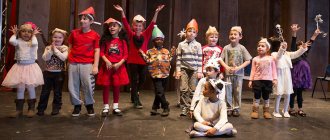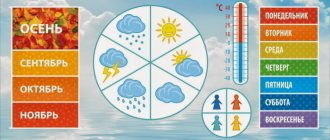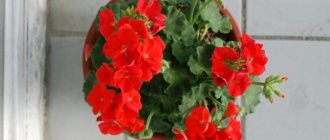What is it needed for?
A place that will introduce children to the world around them should be in all groups. Teachers and the children themselves pay a lot of attention to its design and management. Why is this needed?
There are many goals for working with such visual material:
- environmental education is carried out. In addition, corners of nature in kindergartens develop neatness and a sense of responsibility in children;
- Such places educate and form aesthetic feelings. Having created the necessary conditions, you can grow indoor flowers of different types. This allows children to enjoy a variety of beauty. Preschoolers, seeing this, experience aesthetic pleasure;
- One of the purposes of creation is educational. Children, under the supervision of teachers, work, care for plants and watch how they change throughout the year. They form a connection with them and with phenomena. They learn to water flowers, paying attention to what time of year it is. If it is summer, then watering should be plentiful, if it is winter, then the volume of water is reduced;
- This place develops flower care skills. Kids learn to care for them, water them, wipe dust from window sills, and other types of work;
- the presence of such a place is an opportunity to decorate the group’s room, make it more interesting, more fun for the gameplay.
Decorating a corner of nature in the second junior group
Elena Korshunova
Decorating a corner of nature in the second junior group
Decorating a corner of nature in the second junior group
Korshunova Elena Valerievna
“Nature has taken care of everything so much that everywhere you find something to learn”
Leonardo da Vinci.
Children's knowledge about nature at the age of 3-4 years expands significantly: there is a more complete acquaintance with objects and phenomena of inanimate nature, seasonal changes, the animal and plant world. Children learn the division of animals into domestic and wild and the corresponding differences in their lifestyle and habitat. More extensive information about birds (migratory and wintering) is given, the concept of insects (ants, butterflies) and other representatives of the animal world (lizard, turtle, frog) is formed.
The understanding of the plant world is also enriched: children learn the concepts of “grass”, “tree”, “flower” and learn to distinguish them by external signs. A primary understanding of the needs of living organisms for food, water, heat, and human labor in caring for animals and plants is formed. Children begin to show feelings for objects of nature, animals, plants, and express elementary value judgments about its phenomena: “I like the dog, she guards the house. I don’t like it when it’s raining and cold.” There is an interest in experimenting with water and sand.
All this is reflected in the fullness of our corner of nature, where not only ready-made purchased materials are presented, but also homemade manuals created together with the parents of the group.
"Green Corner"
1. Represented by Houseplants. Large leaves are suitable for learning how to independently care for the plant (cleansing dust). Children can water their own plants. Also included are passports for the care and characteristics of the plant.
2. In the corner there are plants characteristic of different seasons:
— Autumn — an exhibition of vegetables, crafts made from leaves and natural materials;
— Winter — branches of coniferous trees;
- Spring - vegetable garden, planting onions, peas for observations;
— Summer — bouquets of their ornamental plants.
3. Equipment for caring for plants: watering cans, spatulas, rags, rakes, aprons, sticks for loosening.
"Natural material"
in containers: sand, pebbles of different sizes, shells, fruits and seeds of plants, feathers, millet, rice, buckwheat, pine cones, dry plants, HERBARIUM.
"Center of Water and Sand"
1. Plastic containers for water and sand, aprons;
2. Card index of games with water and sand;
3. Natural material;
4. Containers of various capacities, a sand mill, spoons, spatulas, rakes, all kinds of molds, stamps for printing footprints in the sand, sticks, a sieve, small toys for burying and finding, vessels for pouring, floating toys;
5. Magnifier.
"Nature Calendar"
The calendar was made by the student’s mother, as work is being done to establish relationships with parents and actively involve them in the life of the group.
The nature calendar consists of several pages: season, time of day, natural phenomena, doll with clothes for different seasons. Everything is done with Velcro, so children can independently change the nature calendar, as well as develop fine motor skills.
"Moving folder"
The folder contains all the necessary thematic material needed for classes, observations, free and individual activities: riddles, poems, games, coloring pages, cut-out pictures, consultations with parents, posters, and so on.
"Didactic games"
Didactic games are represented by both purchased board games and games created independently and with the involvement of parents: find vegetables and fruits by seeds and seeds, find my shadow, the third odd one, lay it out along the contour. The games “Find My Shadow” and some others can be used repeatedly by using Igrovisor V. Voskobovich.
"Leapbook on ecology"
The laptop contains all the necessary material on ecology: what not to do in nature, prohibitory signs, experiments, environmental tales and games, living and inanimate nature, a maze game, and a waste sorting game.
“Subject and subject pictures”
Children get acquainted with the features of the appearance and lifestyle of fish, insects, and amphibians. There is also a card index of pictures of trees, plants, shrubs, vegetables, fruits and other topics. For free viewing, children are offered sets of toys depicting animals and their young, as well as inhabitants of various ecological systems (ponds, forests).
